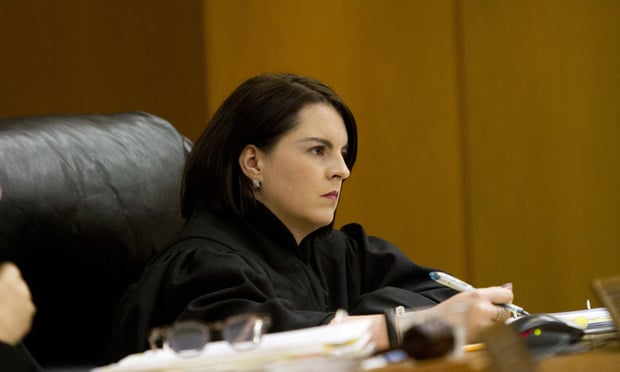Appeals Panel Revives Widow's Wrongful Death Claims Against Valdosta Doctor, Nurses
The opinion said Lowndes County Superior Court Judge Jay Altman should have allowed a widow to join a medical malpractice suit filed by her deceased husband's children even though she waited well beyond the two-year limit to file such claims.
January 06, 2020 at 03:57 PM
6 minute read
 Judge Amanda Mercier. (Photo: John Disney/ALM)
Judge Amanda Mercier. (Photo: John Disney/ALM)
The Georgia Court of Appeals revived medical malpractice claims for wrongful death against a Valdosta kidney specialist and nurses, ruling the trial judge erred in finding a widow waited too long to join the lawsuit filed by his estate and children.
The trial judge had agreed with the doctor's lawyers that the widow could not "relate back" to the original complaint and intervene in the litigation by allowing the two-year statute of limitations to run before seeking to join suit.
But the Jan. 3 opinion authored by Judge Amanda Mercier with the concurrence of Judges Anne Elizabeth Barnes and E. Trenton Brown III, said allowing the widow to join the suit "would not have altered the substance of the wrongful death claim or changed the underlying circumstances set forth in the original complaint.
"It simply sought to incorporate the widow as a necessary party to the wrongful death action," Mercier wrote.
Further, she said, there was no indication Eunice Seay's decision to join the suit after the statute of limitations elapsed was an effort to delay or prejudice the defendants' cases. Seay also readily admitted she did not want to sue when the case was filed, but later had a "change of heart."
The panel also dismissed a related appeal filed by the kidney clinic whose claims were not tossed out along with the doctor and nurses, ruling that its decision reinstating the claims rendered that appeal moot.
The lawyers for the plaintiffs are Atlanta solo Steven Beard, Charles Cork III of Decatur and Robert Howell of Moultrie's Howell Law Firm. Beard said he had no comment on the ruling other than to note that it was in his clients' favor.
The lawyers for Dr. Ven Chiang and the other defendants include Andrew Wilkes and William Drought III of Savannah's Oliver Maner, and Gregory Talley and Beau Howell of Coleman Talley in Valdosta. They did not immediately respond to request for comment.
According to the opinion and other filings, the case involves the July 2014 death of John Seay, who was hospitalized after he began to bleed from the site of his weekly dialysis treatments.
After his death, according to an appellate brief, relations between his widow and children soured, and Eunice Seay had no interest in filing a medical malpractice lawsuit against his caregivers and the clinic.
The two-year filing deadline had almost run in 2016 when Seay's estate executor and son, Roy Seay, along with five siblings sued the doctor and clinic in Lowndes County Superior Court claiming they should have detected and treated an aneurysm blamed for his death.
The suit named Chiang and the Valdosta Kidney Clinic, along with Total Renal Care, DaVita Accountable Care Solutions, DaVita Rx and five John Doe defendants.
Nearly two years later, in 2018, the plaintiffs moved to either substitute Eunice Seay as the plaintiff or add her as a party. She also moved to intervene in the case.
The defense argued that the plaintiffs had no legal standing to bring the claims because, as John Seay's widow, Eunice Seay was the appropriate party to bring suit under Georgia law.
They also argued that allowing her to enter the case long after the statute of limitations had run would effectively nullify the law.
Judge Jay Altman II agreed with most of the defense arguments, and in January 2019 he signed an order declaring that the wrongful death action "was not filed by the appropriate party" and that Eunice Seay was the proper party to have filed the suit.
"The initial plaintiffs, the children of the decedent, were adults at the time of filing, the widow of the decedent was and is living, and the children of the decedent had not been abandoned," the order said. "No exception to the rule of proper plaintiffs exists."
"The attempt to add her as a separate and distinct party came long after the statute of limitations had expired," the order said, "and she is not entitled to have her case relate back to the time of initial filing."
Altman's order—which said it was "Prepared by counsel for all parties in accordance to the court's instructions"—also said the judgement applied only to "the wrongful death action for the doctor and nurses. The action against the technical providers and the action by the estate, other than any wrongful death action, are not affected by this order."
The plaintiffs and the "technical providers"—the DaVita defendants—each filed separate appeals.
In vacating Altman's order, Mercier wrote that Georgia law generally allows a surviving spouse to sue for wrongful death. If there is no surviving spouse, the child or children can sue; and if there are no children, a parent can sue. The deceased's estate can sue when none of those parties are available.
"In a typical case, therefore, a spouse has exclusive standing to bring a claim for the wrongful death of the decedent," Mercier's opinion said. "Seay's widow was alive when the plaintiffs filed the wrongful death complaint, creating an issue as to standing."
The plaintiffs tried to resolve that issue by adding her to the case, which state law allows "on motion of any party … at any stage of the action and on such terms as are just."
Altman's order noted that the statute of limitations had "long" expired when that effort was made, and a trial judge has the discretion to allow or deny a party to be added, the opinion said.
"But in reaching its decision," Mercier wrote, the judge must take into account a statute "which allows an amendment adding a party to relate back to the filing of the original complaint," if that party's claims arise from the same facts as those asserted in that complaint.
The motion to add Seay's widow met the requirements of the law, she said.
"We recognize that the statute of limitation expired on the wrongful death claim approximately two years before the plaintiffs moved to amend the complaint by adding the widow as a party," the opinion said, but that delay is not sufficient to deny the motion.
This content has been archived. It is available through our partners, LexisNexis® and Bloomberg Law.
To view this content, please continue to their sites.
Not a Lexis Subscriber?
Subscribe Now
Not a Bloomberg Law Subscriber?
Subscribe Now
NOT FOR REPRINT
© 2025 ALM Global, LLC, All Rights Reserved. Request academic re-use from www.copyright.com. All other uses, submit a request to [email protected]. For more information visit Asset & Logo Licensing.
You Might Like
View All

Upcoming Changes to Medicare Secondary Payer Reporting: What WC Insurers and Attorneys Need to Know
5 minute read
Biden Administration Tells Justices That Bans on Gender Care Are Sex Discrimination

11th Circuit Allows Florida Transgender Health Care Ban to Continue Pending Full Appeal on Constitutionality of Law
Law Firms Mentioned
Trending Stories
Who Got The Work
J. Brugh Lower of Gibbons has entered an appearance for industrial equipment supplier Devco Corporation in a pending trademark infringement lawsuit. The suit, accusing the defendant of selling knock-off Graco products, was filed Dec. 18 in New Jersey District Court by Rivkin Radler on behalf of Graco Inc. and Graco Minnesota. The case, assigned to U.S. District Judge Zahid N. Quraishi, is 3:24-cv-11294, Graco Inc. et al v. Devco Corporation.
Who Got The Work
Rebecca Maller-Stein and Kent A. Yalowitz of Arnold & Porter Kaye Scholer have entered their appearances for Hanaco Venture Capital and its executives, Lior Prosor and David Frankel, in a pending securities lawsuit. The action, filed on Dec. 24 in New York Southern District Court by Zell, Aron & Co. on behalf of Goldeneye Advisors, accuses the defendants of negligently and fraudulently managing the plaintiff's $1 million investment. The case, assigned to U.S. District Judge Vernon S. Broderick, is 1:24-cv-09918, Goldeneye Advisors, LLC v. Hanaco Venture Capital, Ltd. et al.
Who Got The Work
Attorneys from A&O Shearman has stepped in as defense counsel for Toronto-Dominion Bank and other defendants in a pending securities class action. The suit, filed Dec. 11 in New York Southern District Court by Bleichmar Fonti & Auld, accuses the defendants of concealing the bank's 'pervasive' deficiencies in regards to its compliance with the Bank Secrecy Act and the quality of its anti-money laundering controls. The case, assigned to U.S. District Judge Arun Subramanian, is 1:24-cv-09445, Gonzalez v. The Toronto-Dominion Bank et al.
Who Got The Work
Crown Castle International, a Pennsylvania company providing shared communications infrastructure, has turned to Luke D. Wolf of Gordon Rees Scully Mansukhani to fend off a pending breach-of-contract lawsuit. The court action, filed Nov. 25 in Michigan Eastern District Court by Hooper Hathaway PC on behalf of The Town Residences LLC, accuses Crown Castle of failing to transfer approximately $30,000 in utility payments from T-Mobile in breach of a roof-top lease and assignment agreement. The case, assigned to U.S. District Judge Susan K. Declercq, is 2:24-cv-13131, The Town Residences LLC v. T-Mobile US, Inc. et al.
Who Got The Work
Wilfred P. Coronato and Daniel M. Schwartz of McCarter & English have stepped in as defense counsel to Electrolux Home Products Inc. in a pending product liability lawsuit. The court action, filed Nov. 26 in New York Eastern District Court by Poulos Lopiccolo PC and Nagel Rice LLP on behalf of David Stern, alleges that the defendant's refrigerators’ drawers and shelving repeatedly break and fall apart within months after purchase. The case, assigned to U.S. District Judge Joan M. Azrack, is 2:24-cv-08204, Stern v. Electrolux Home Products, Inc.
Featured Firms
Law Offices of Gary Martin Hays & Associates, P.C.
(470) 294-1674
Law Offices of Mark E. Salomone
(857) 444-6468
Smith & Hassler
(713) 739-1250






